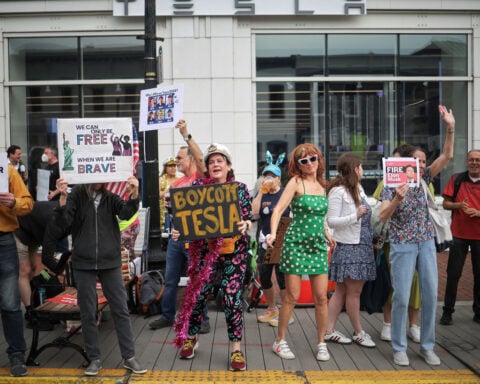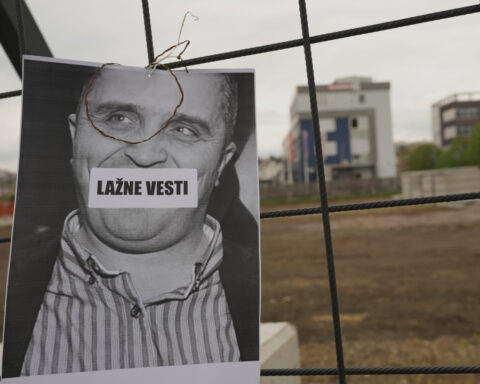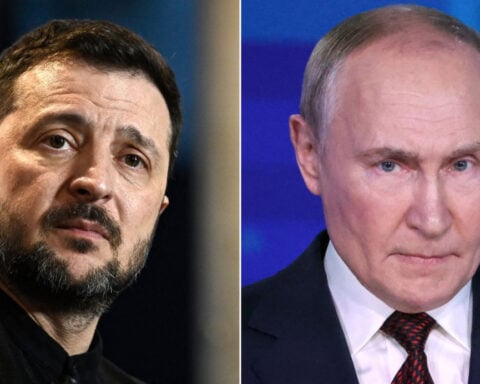Since the Responsibility to Protect was adopted, the veto has been used to block action on mass atrocities several times. Russia and China have used their veto to block action in cases related to the crisis in Syria. Meanwhile, the U.S. has repeatedly vetoed action over Israel’s treatment of Palestinians in the occupied territories.
The power to veto also acts as a deterrent, preventing issues from being brought before the Security Council. If member states believe a permanent member will block a resolution, they may decide not to bring the issue before the council for a vote.
Vetoing the veto
The idea of reforming the council so that the five permanent members do not have veto powers on resolutions related to mass atrocities is not new.
It gained traction in 2013 after France’s then-President François Hollande addressed the U.N. General Assembly and stated that “whenever [the United Nations] proves to be powerless, it’s peace that pays the price.” Hollande called for a “code of good conduct” whereby the permanent members could decide to “collectively renounce their veto powers” regarding mass atrocities.
In 2015, Mexico joined France in formally calling for the suspension of veto powers in such cases. As of 2023, 106 states have expressed support for this effort.
Separately in 2015, the Accountability, Coherence and Transparency Group – 27 states that work to enhance the Security Council’s effectiveness – proposed a “Code of Conduct on Genocide, Crimes against Humanity and War Crimes.” It called on states to “voluntarily commit themselves not to vote against a draft resolution of the Security Council in which the Council takes measures to end these crimes.” The key difference between the two proposals is that the ACT Group’s code of conduct would apply to both permanent and nonpermanent members of the Security Council. As of 2023, 129 U.N. members and observers have signed.
The issue of the Security Council veto has come up during the drafting of the Pact for the Future.
An earlier version of the draft pact held that member states “encourage a collective and voluntary agreement among the permanent members of the Security Council to refrain from the use of the veto when the Security Council intends to take action to prevent or halt genocide, crimes against humanity or war crimes.”
But this paragraph was removed in a subsequent revision.
The latest version due to be discussed at the summit references the need to address veto reform and “intensify efforts to reach an agreement on the future of the veto, including discussions on limiting its scope and use.”
But achieving true veto reform has proven difficult in the past, as permanent members have been reluctant to relinquish this extraordinary power.
Less representative, but no less power
The veto debate forms part of a larger discussion that many states, especially in the Global South, want to have over the shape of the U.N.’s highest body.
Next year will mark the 80th anniversary of the founding of the United Nations. In the conferences that preceded the creation of the U.N., the allied victors of World War II negotiated to give themselves permanent membership on the Security Council and veto power.
But the world looks very different today than it did in 1945. The five permanent members are no longer all allies, and membership of the U.N. has grown significantly from 51 original members to 193 members today.
As the U.N. has grown, it has added more members to the Security Council, expanding from 11 to 15 members in 1963.
But the number of permanent members has not changed. And while in 1945 they represented close to half the world’s population and 10% of member states, that has dwindled to about a quarter and 2.5%, respectively.
Despite becoming less representative, this five-member club still has the power – should it find the willingness to use it – to exert pressure to end many mass atrocities that are causing incredible suffering and death and driving the highest level of global displacement in history, with more than 120 million people forcibly displaced in 2024.
But it has failed to do so. And while there are several challenges that need to be addressed in the Pact for the Future, any efforts to safeguard the safety of peoples now and in the future will be undermined without reform of the Security Council and its veto powers.
Mike Brand does not work for, consult, own shares in or receive funding from any company or organization that would benefit from this article, and has disclosed no relevant affiliations beyond their academic appointment.
Source: The Conversation

 Trump has begun another trade war. Here's a timeline of how we got here
Trump has begun another trade war. Here's a timeline of how we got here
 Canada's leader laments lost friendship with US in town that sheltered stranded Americans after 9/11
Canada's leader laments lost friendship with US in town that sheltered stranded Americans after 9/11
 Chinese EV giant BYD's fourth-quarter profit leaps 73%
Chinese EV giant BYD's fourth-quarter profit leaps 73%
 You're an American in another land? Prepare to talk about the why and how of Trump 2.0
You're an American in another land? Prepare to talk about the why and how of Trump 2.0
 Chalk talk: Star power, top teams and No. 5 seeds headline the women's March Madness Sweet 16
Chalk talk: Star power, top teams and No. 5 seeds headline the women's March Madness Sweet 16
 Purdue returns to Sweet 16 with 76-62 win over McNeese in March Madness
Purdue returns to Sweet 16 with 76-62 win over McNeese in March Madness








